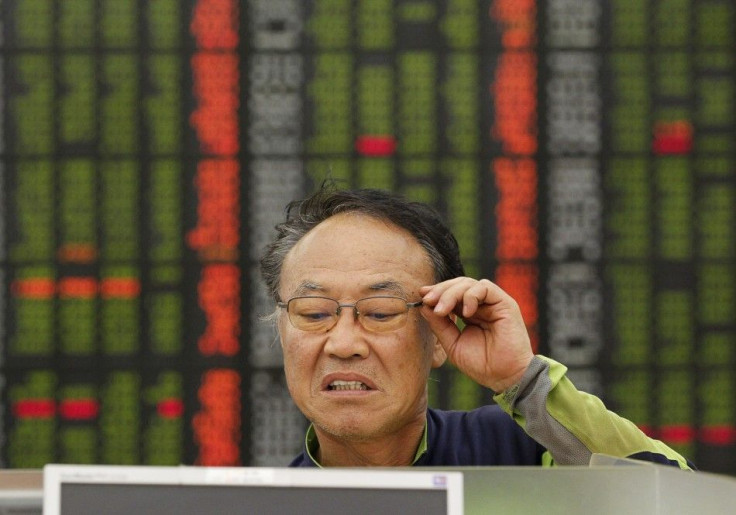Asian Markets Continue Slide; S. Korea Index Down 5%

Asian stocks extended losses Friday, with South Korea's benchmark shedding 5 percent on growing fears the U.S. economy was sliding into recession and as some European lenders faced short-term funding strains, raising fears of a systemic banking crisis on the continent.
Spot gold rose more than 1 percent to an all-time high of $1,844.55 an ounce, before easing to $1,840.94 by 0410 GMT (12:10 a.m. EDT). The gains put it on track to a 5.6 percent weekly rise, its seventh gain in a row and the largest since February 2009.
Oil prices fell and U.S. Treasuries surged as investors rushed into safe-havens after heavy losses on U.S. and European markets overnight.
European equities suffered their biggest daily slide in two years Thursday, while the S&P 500 index fell 4.5 percent, the sixth time in two weeks that it has moved by 4 percent or more in a single session.
S&P 500 futures fell 0.7 percent in Asia, pointing to more losses for battered Western markets later in the day.
The MSCI index of Asia-Pacific stocks outside Japan fell 3.3 percent, taking its losses this month to nearly 14 percent.
(The U.S. data) presents the worst combination for an economy, i.e. slower growth but higher inflation, that impacted quite negatively sentiment in Asia trading hours, Frances Cheung, strategist at Credit Agricole told Reuters Insider.
Worse still, we also have some funding squeeze coming from Europe and also across a number of Asian markets, she said.
In Asia Friday, Japan's Nikkei 225 index fell 1.9 percent for a third day of declines, while Korea's KOSPI tumbling more than 5 percent and Taiwan down more than 3 percent, suggesting the pressure was more on markets with a higher exposure to technology.
Several global industry heavyweights such as Dell, Hewlett-Packard and LG Electronics have cut sales forecasts this week as the outlook for corporate, government and consumer tech spending dims.
A drop in factory activity in the U.S. Mid-Atlantic region to the lowest level since March 2009 stunned investors, as the data from the Philadelphia Federal Reserve Bank is viewed as a forward-looking indicator of national manufacturing.
An unexpected fall in existing U.S. home sales in July and a greater-than-expected rise in new claims for jobless benefits in the latest week also added to fears that the U.S. economic recovery could stall and possibly slide into recession.
In Europe, renewed fears that the euro zone debt crisis could infect the region's financial system put pressure on short-term funding markets, forcing some European banks to pay higher rates for U.S. dollar loans and reviving memories of the dark days of late 2008 after the collapse of U.S. investment bank Lehman Brothers as funding dried up.
Clearly, these euro-zone banks are having a tough time raising money, but it's not at a level that's alarming, said Joe D'Angelo, managing director of money markets at Prudential Fixed Income in Newark, N.J., who oversees $50 billion in assets.
The U.S. dollar was flat in Asia after earlier modest gains as investors piled into the safety of U.S. Treasuries despite falling yields.
There are still some strains in Asian FX swap... markets, in which investors are selling dollar and then buying dollar forwards in order to get some short-term U.S. dollar funding, said Cheung.
U.S. 30-year Treasuries surged more than a full point in Asia, with traders saying the papers were getting an added boost from vague rumors about an emergency Fed meeting later Friday.
Brent oil hit a session low of $106.05 a barrel, down nearly $1 from the previous session. Brent has lost more than 9 percent this month, the worst since a near 15 percent drop in May 2010.
© Copyright Thomson Reuters 2024. All rights reserved.





















